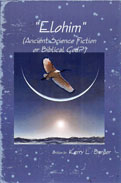"I have sought to find additional truths underlying biblical texts by researching historical and archeological data."

 |
Elohim: Ancient Science Fiction
or Biblical God? by Kerry L. Barger Kerry L. Barger
book review by Peter M. Fitzpatrick
Sumerian literature, lately rediscovered through archeological relics over 5,000 years old, is composed of cuneiform letters that are difficult to translate. As a result, widely varying interpretations of its meaning have fueled controversial theories, the most famous perhaps being those of Zechariah Sitchin. His ideas about ancient astronauts from a planet beyond Neptune that mine gold on Earth by genetically engineering Homo erectus with their own DNA to produce Homo Sapiens, are echoed here. Kerry frames his narrative in the recollections of the Biblical Nehemiah as he is returning to Israel after the Babylonian Captivity. His memory of the Sumerian shards he was made to translate lead to a "flashback" style of recasting the Book of Genesis retold as if "Elohim" was in fact an ancient astronaut. The planet of origin is updated to the recently mapped Eris, 27 times more massive than Pluto. All "tree-of life" references are interpreted as being symbolic of DNA strands.
The book is very heavy on theme, of course, the Biblical language of the ancient astronauts almost a word-for-word transliteration of passages from Genesis. As such, the characters are not deeply fleshed out, their function chiefly being to argue the author’s thesis. The plot is Epic, of course, the creation of modern humans, but that is not the author's concern, really. His main purpose is to re-affirm a transcendent God behind it all, and to reconcile Sitchin's theories with religious belief. Not likely to be carried by Christian bookstores, the writer is nevertheless committed to a Christian belief.